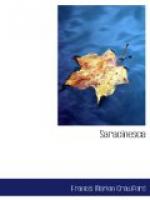In considering an account of the life of Giovanni Saracinesca from the time when, in 1865, he was thirty years of age, down to the present day, it is therefore just that he should be judged with a knowledge of some of these peculiarities of his class. He is not a Roman of the people like Giovanni Cardegna, the great tenor, and few of his ideas have any connection with those of the singer; but he has, in common with him, that singular simplicity of character which he derives from his Roman descent upon the male side, and in which will be found the key to many of his actions both good and bad—a simplicity which loves peace, but cannot always refrain from sudden violence, which loves and hates strongly and to some purpose.
CHAPTER II.
The hour was six o’clock, and the rooms of the Embassy were as full as they were likely to be that day. There would doubtless have been more people had the weather been fine; but it was raining heavily, and below, in the vast court that formed the centre of the palace, the lamps of fifty carriages gleamed through the water and the darkness, and the coachmen, of all dimensions and characters, sat beneath their huge umbrellas and growled to each other, envying the lot of the footmen who were congregated in the ante-chamber up-stairs around the great bronze braziers. But in the reception-rooms there was much light and warmth; there were bright fires and softly shaded lamps; velvet-footed servants stealing softly among the guests, with immense burdens of tea and cake; men of more or less celebrity chatting about politics in corners; women of more or less beauty gossiping over their tea, or flirting, or wishing they had somebody to flirt with; people of many nations and ideas, with a goodly leaven of Romans. They all seemed endeavouring to get away from the men and women of their own nationality, in order to amuse themselves with the difficulties of conversation in languages not their own. Whether they amused themselves or not is of small importance; but as they were all willing to find themselves together twice a-day for the five months of the Roman season—from the first improvised dance before Christmas, to the last set ball in the warm April weather after Easter—it may be argued that they did not dislike each other’s society. In case the afternoon should seem dull, his Excellency had engaged the services of Signor Strillone, the singer. From time to time he struck a few chords upon the grand piano, and gave forth a song of his own composition in loud and passionate tones, varied with, very sudden effects of extreme pianissimo, which occasionally surprised some one who was trying to make his conversation heard above the music.




